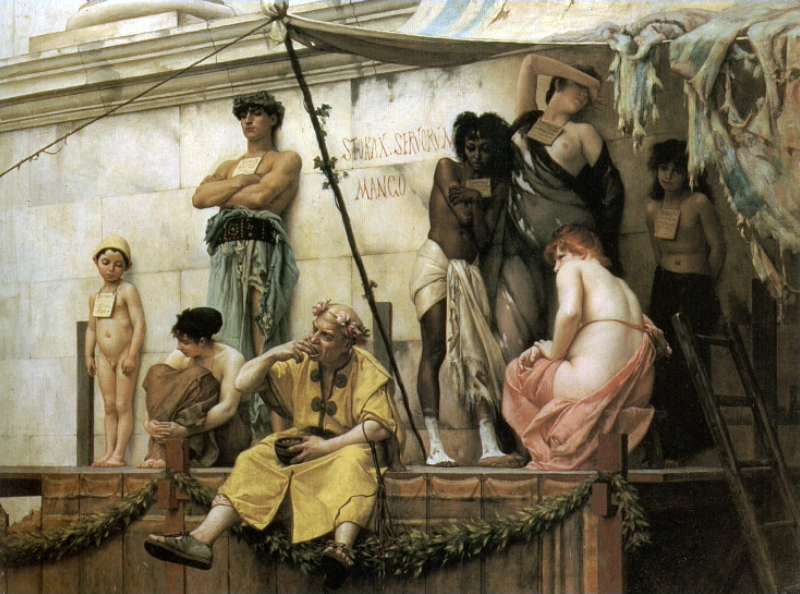
Since Canadian Christians and other monothieists based on the Abrahamic traditions of the old testament claim Marriage is a Sacred institution and thus that justifies their attempts to overturn Canada's Same Sex Marriage laws then let them not be hypocrites.
It's time to bring back that other sacred institution of the Old Testament, slavery. Abolitionism was liberal heresy. It not only violated the sacred institution of slavery but it led to that other liberal heresy feminism.
Time to bring back the good old laws of the Old Testament. Otherwise social conservatives are just hypocrites not worthy of whistling Dixie.
The first instance of slavery in the Bible consists of Noah's punishment of his son Canaan for some serious sexual sin (the details of which are unknown): "Cursed be Canaan; a slave of slaves shall he be to his brothers."(Gen 9: 27). Slavery, then, was in the first Biblical instance a punishment for some grievous sin. Generally this was the rule of the Law, with an exception to be noted below. Thus theives and enemies of the Jews could be made slaves,(cf. Ex 22:2; 2 Chr 28:8-15) but a Jew who arbitrarily took a slave would be punished by death.(Ex 21: 16)
Slavery in the Bible
See Sabbatical year, Onesimus, Bible-based advocacy of slavery, in addition to the details of the Book of Exodus.
Old Testament or Tanakh
Leviticus draws a distinction between Hebrew debt slavery:
- 25:39 If your brother becomes impoverished with regard to you so that he sells himself to you, you must not subject him to slave service.
- 25:40 He must be with you as a hired worker, as a resident foreigner; he must serve with you until the year of jubilee,
- 25:41 but then he may go free, he and his children with him, and may return to his family and to the property of his ancestors.
- 25:42 Since they are my servants whom I brought out from the land of Egypt, they must not be sold in a slave sale.
- 25:43 You must not rule over him harshly, but you must fear your God.
and "bondslaves", foreigners:
- 25:44 As for your male and female slaves who may belong to you, you may buy male and female slaves from the nations all around you.
- 25:45 Also you may buy slaves from the children of the foreigners who reside with you, and from their families that are with you, whom they have fathered in your land, they may become your property.
- 25:46 You may give them as inheritance to your children after you to possess as property. You may enslave them perpetually. However, as for your brothers the Israelites, no man may rule over his brother harshly.
Quotations by learned men from the 19th century:
| "[Slavery] was established by decree of Almighty God...it is sanctioned in the Bible, in both Testaments, from Genesis to Revelation...it has existed in all ages, has been found among the people of the highest civilization, and in nations of the highest proficiency in the arts." Jefferson Davis, President of the Confederate States of America. 1,2 | |
| "There is not one verse in the Bible inhibiting slavery, but many regulating it. It is not then, we conclude, immoral." Rev. Alexander Campbell | |
| "The right of holding slaves is clearly established in the Holy Scriptures, both by precept and example." Rev. R. Furman, D.D., Baptist, of South Carolina | |
| "The hope of civilization itself hangs on the defeat of Negro suffrage." A statement by a prominent 19th-century southern Presbyterian pastor, cited by Rev. Jack Rogers, moderator of the Presbyterian Church (USA). | |
| "The doom of Ham has been branded on the form and features of his African descendants. The hand of fate has united his color and destiny. Man cannot separate what God hath joined." United States Senator James Henry Hammond. 3 |
Quotation from the 21st century:
"If we apply sola scriptura to slavery, I'm afraid the abolitionists are on relatively weak ground. Nowhere is slavery in the Bible lambasted as an oppressive and evil institution: Vaughn Roste, United Church of Canada staff.Overview:The quotation by Jefferson Davis, listed above, reflected the beliefs of many Americans in the 19th century. Slavery was seen as having been "sanctioned in the Bible." They argued that:
Eventually, the abolitionists gained sufficient power to eradicate slavery in most areas of the world by the end of the 19th century. Slavery was eventually recognized as an extreme evil. But this paradigm shift in understanding came at a cost. Christians wondered why the Bible was so supportive of such an immoral practice. They questioned whether the Bible was entirely reliable. Perhaps there were other practices that it accepted as normal which were profoundly evil -- like genocide, torturing prisoners, raping female prisoners of war, executing religious minorities, burning some hookers alive, etc. The innocent faith that Christians had in "the Good Book" was lost -- never to be fully regained. |
Marriage
Gay
Find blog posts, photos, events and more off-site about:
Canada, slavery, same-sex-marriage, feminism, Old-Testabment, bible, Abrahamicreligions, Islam, Christianity, evangelicals, sacred, Jews, Judea, abolition, abolitionism, abolistionist, parliament, politics, Harper, vote,
1 comment:
Eugene:
Don't forget that if we are going to maintain traditional marriage that we have to re-institute the dowry and laws that make the wife the personal property of the husband. Ah, the good old days.
Post a Comment